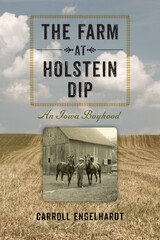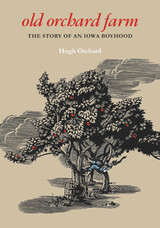Carroll Engelhardt’s parents grew up in homes without electricity on farms without tractors and began farming in the same way. As a farm boy in northeastern Iowa, he thought that history happened only to important people in earlier times and more exotic places. After decades of teaching, he at last perceived that history happens to us all, and he began writing this book. Set within the thoughtfully presented contexts of the technological revolution in American agriculture, the Second World War, the Cold War, and the emerging culture of affluence, The Farm at Holstein Dip is both a loving coming-of-age memoir and an educational glimpse into rural and small-town life of the 1940s and 1950s.
Engelhardt writes about growing up in a spacious farmhouse where life was centered in the kitchen and frugality dictated that every purchase be weighed carefully. His chores grew up with him: he fed chickens and gathered eggs at age six, rode a horse on the hayfork at nine or ten, milked cows by hand at eleven, and hired out to other farmers to load bales in the field and work in the haymow at fifteen. The simple pleasures and predictable routines of a Saturday night at the movies in nearby Elkader, Pioneer Days on the 4th of July, Confirmation Sunday, class picnics, and baseball and basketball games play out against a background of rural decline, alternating economic uncertainty and prosperity, and Cold War anxiety—next to polio, he most feared Communist subversion and atomic blasts. The values and contradictions imparted by this evolving mix of international, national, and local cultures shaped his coming of age.
Engelhardt brings us into the world of his fourth-generation farm family, who lived by the family- and faith-based work ethic and concern for respectability they had inherited from their German and Norwegian ancestors. His writing has a particularly Iowa flavor, a style that needs no definition to those who live in the state. Readers will discover the appeal of his wry, humorous, and kind observations and appreciate his well-informed perspective on these transformative American decades.











